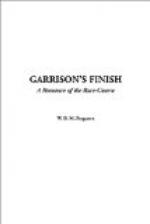“Assiduously cultivated,” replied Doctor Blandly dryly. “You’ll have to get back to first principles, my boy. You’ve made an oven out of your lungs by cigarette smoke. You inhale? Of course. Quite the correct thing. Have you ever blown tobacco smoke through a handkerchief? Yes? Well, it leaves a dark-brown stain, doesn’t it? That’s what your lungs are like—coated with nicotine. Your wind is gone. That is why cigarettes are so injurious. Not because, as some people tell you, they are made of inferior tobacco, but because you inhale them. That’s where the danger is. Smoke a pipe or cigar, if smoke you must; those you don’t inhale. Keep your lungs for what God intended them for—fresh air. Then, your vitality is nearly bankrupt. You’ve made an old curiosity-shop out of your stomach. You require regular sleep—tons of it——”
“But I’m never sleepy,” argued Garrison, feeling very much like a schoolboy catechised by his master. “When I wake in the morning, I awake instantly, every faculty alert—”
“Naturally,” grunted the old doctor. “Don’t you know that is proof positive that you have lived on stimulants? It is artificial. You should be drowsy. I’ll wager the first thing you do mornings is to roll a smoke; eh? Exactly. Smoke on an empty stomach! That’s got to be stopped. It’s the simple life for you. Plenty of exercise in the open air; live, bathe, in sunshine. It is the essence of life. I think, major, we can cure this young prodigal of yours. But he must obey me—implicitly.”
Subsequently, Major Calvert had, for him, a serious conversation with Garrison.
“I believe in youth having its fling,” he said kindly, in conclusion; “but I don’t believe in flinging so far that you cannot retrench safely. From Doctor Blandly’s statements, you seem to have come mighty near exceeding the speed limit, my boy.”
He bent his white brows and regarded Garrison steadily out of his keen eyes, in which lurked a fund of potential understanding.
“But sorrow,” he continued, “acts on different natures in different ways. Your mother’s death must have been a great blow to you. It was to me.” He looked fixedly at his nails. “I understand fully what it must mean to be thrown adrift on the world at the age you were. I don’t wish you ever to think that we knew of your condition at the time. We didn’t—not for a moment. I did not learn of your mother’s death until long afterward, and only of your father’s by sheer accident. But we have already discussed these subjects, and I am only touching on them now because I want you, as you know, to be as good a man as your mother was a woman; not a man like your father was. You want to forget that past life of yours, my boy, for you are to be my heir; to be worthy of the name of Calvert, as I feel confident you will. You have your mother’s blood. When your health is improved, we will discuss more serious questions, regarding your future, your career; also—your marriage.” He came over and laid a kindly hand on Garrison’s shoulder.




